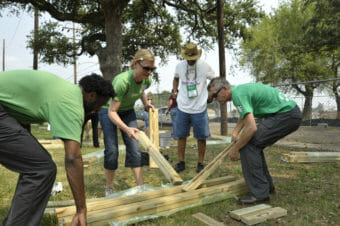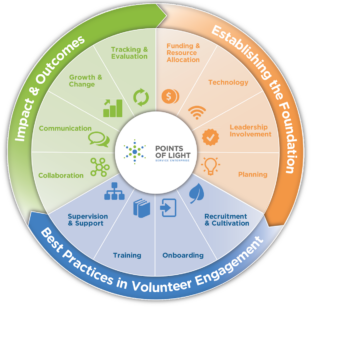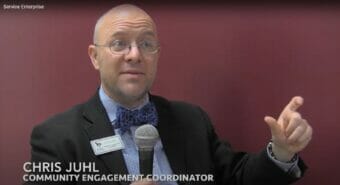Service Enterprise
We help organizations leverage the skills and expertise of their volunteers to increase their social impact and strengthen communities.
We help organizations leverage the skills and expertise of their volunteers to increase their social impact and strengthen communities.
We help organizations leverage the skills and expertise of their volunteers to increase their social impact and strengthen communities.
The Service Enterprise program is now proudly operated by our partners at AL!VE (Association of Leaders in Volunteer Engagement). This partnership reflects our shared commitment to elevating the strategic role of volunteer engagement across sectors. For current program details and resources, please visit their website.
POINTS OF LIGHT’S SERVICE ENTERPRISE PROGRAM STRENGTHENS NONPROFIT CAPACITY THROUGH THE FUNDAMENTAL AND STRATEGIC USE OF VOLUNTEERS AND THEIR SKILLS TO ADDRESS COMMUNITY NEEDS.
Organizations certified as Service Enterprises have access to:
Organizations have access to the Service Enterprise Diagnostic, a thorough, research-based assessment of their existing volunteer engagement practices that informs their training and provides tailored recommendations for improvement.
Organizations receive up to 16 hours of training focused on change management and volunteer engagement to help them transform and reimagine how they currently engage volunteers.
Organizations receive up to 10 hours of coaching to help them translate knowledge from the training into action for their organization.
Organizations receive a designation signifying a commitment to leveraging the time and talent of volunteers to meet the organization’s social mission.
Organizations that join the Service Enterprise program will be able to network with each other, share best practices and provide peer-to-peer support.
Organizations gain access to proprietary content and research, including a robust resource library with trends and reports about how best to engage and manage volunteers.
The Service Enterprise program started in 2010 with a simple question: how can we better engage volunteers? It has since become one of the nation's most impactful nonprofit certification programs.
The Service Enterprise program began in 2010 when Reimagining Service partners CommonGood Careers, Deloitte, Taproot Foundation, The RGK Center for Philanthropy at the University of Texas and TCC Group collaborated around research and best practices for volunteer engagement. Based on this research, CaliforniaVolunteers leveraged a grant they received from the Corporation for National and Community Service to start a pilot project aimed at strengthening the capacity of volunteer organizations.
In 2012, Points of Light joined the partnership, collaborating with the RGK Center and TCC Group to integrate a diagnostic component that informs the process for organizations taking part in the program. Points of Light then developed the curriculum, marketing materials and content necessary to scale the program to organizations within our affiliate Network and other partners in the sector.

Since then, the program has scaled across the country through a network of Service Enterprise Hubs operating in more than 20 states, having certified over 650 organizations as Service Enterprises.
In 2022, Points of Light partnered with AL!VE, the Association of Leaders in Volunteer Engagement, to operate and lead the Service Enterprise program. We thank all involved for their leadership, early investment, research and assessment tools that built the foundation from which AL!VE will grow the program.
Based on rigorous research, Points of Light’s Service Enterprise program utilizes a proven process that starts with a diagnostic which informs the training and coaching organizations experience before they are certified. As organizations apply new learnings, they continuously assess their progress and retrain as needed. Typically, the process from start to certification takes six months to a year

The program is currently delivered through a national network of Service Enterprise Hubs, which have partnered with Points of Light and AL!VE to certify more than 650 organizations nationwide since 2012.
The Service Enterprise curriculum is based on an analysis of data from more than 600 organizations that took the TCC Group’s Core Capacity Assessment Tool. Data showed that 11% of these organizations were top performers in volunteer management, and we called this elite group “Service Enterprises.” Other key findings among Service Enterprises:

Based on additional, thorough analysis of the data, Deloitte, Points of Light, Algorhythm and the RGK Center for Philanthropy at the University of Texas at Austin identified twelve core characteristics that are now the basis for the determination of a Service Enterprise:
1. Leadership Involvement: Executive and board leadership demonstrate through actions their commitment to community involvement, and the engagement of volunteers as a key strategy to achieve the organization’s mission.
2. Planning: Thoughtful, comprehensive preparations for volunteer and community engagement based on established principles and practices of effective management.
3. Funding & Resource Allocation: The provision of the financial, human, space, and material tools, and means, necessary for the engagement of volunteers, as well as the willingness to seek additional support as needed.
4. Technology: The broad-based utilization of technology to facilitate all aspect of volunteer engagement, including record keeping, communication, and service options.
5. Cultivation: Engaging individuals and groups to serve your organization is an ongoing cultivation process. Recruitment should be targeted to assure a diverse mix of community members with the skills, interest and abilities to further your mission.
6. Onboarding: Providing a smooth pathway to service through careful screening, preparation, and guidance that includes both community members and staff involvement.
7. Supervision & Support: Supervision assures that oversight and support are consistently provided to volunteers and community partners to ensure they are given the opportunity to succeed, and to feel valued and appreciated.

8. Training: Education and skill development, as well as the knowledge of organizational parameters and boundaries, are critical to ensure that both volunteers and staff are equipped to perform their work and to work effectively together.
9. Tracking & Evaluation: Tracking and evaluation assesses the degree to which an organization monitors progress towards institutional goals and the performance of volunteers, staff and community partners in reaching these objectives.
10. Communication: Effective communication takes many forms, and operates through an increasingly wide and diverse array of channels including formal and informal means, print and social media to send information to external and internal groups.
11. Growth & Change: Vibrant, exciting organizations seek ways to improve services, cultivate leaders, continuously seed new ways of thinking, and create new platforms for action and problem solving. Staying on the cutting edge of industry practices motivates staff, whether salaried, or non-salaried.
12. Collaboration: Being a part of your community is vital to the work and services of nonprofit and public sector organizations. Collaborative undertakings with other organizations, your constituents, and your volunteers, build relationships and sharpen the focus of service organizations.
“Going through Service Enterprise has really opened our eyes as to how volunteerism should look for our organization. The
process has helped us put a much bigger focus on our volunteer program and our volunteer efforts, in turn making it a central part of our daily discussions. Our chapter’s ROVI has increased 67% since we started tracking this number, which shows to our staff, donors and board that the investment we are making in volunteerism is making a huge impact. We now ask the question, “what can’t a volunteer do?” often, and incorporate volunteers in almost all aspects of our business.”
—Josh Nuss, Executive Director, The ALS Association Iowa Chapter (read their case study)

Watch a Case Study Video From Volunteer Iowa >
“One of the core values of Maggie’s Place is community. Service Enterprise has helped us to build the structure we needed to fully support and sustain the volunteers in our community. Here at Maggie’s Place, our staff truly feel that volunteers are the heart of the home. We know it is up to us to provide a healthy, safe, and meaningful experience for all volunteers.”
-Alysse Lerager, Maggie’s Place (read their case study)
“Service Enterprise forced us to become proactive in our volunteer engagement efforts rather than reactive. In less than 6 months, our Return on Volunteer Investment increased from $3.42 – $5.38.”
— Jessica Elbe, Northwest Compass, Inc.
Interested in learning more about the research on volunteerism and Points of Light’s Service Enterprise program? Check out these resources:
The Service Enterprise program began in 2010 when Reimagining Service partners CommonGood Careers, Deloitte, Taproot Foundation, The RGK Center for Philanthropy at the University of Texas and TCC Group collaborated around research and best practices for volunteer engagement. Based on this research, CaliforniaVolunteers leveraged a grant they received from the Corporation for National and Community Service to start a pilot project aimed at strengthening the capacity of volunteer organizations.
In 2012, Points of Light joined the partnership, collaborating with the RGK Center and TCC Group to integrate a diagnostic component that informs the process for organizations taking part in the program. Points of Light then developed the curriculum, marketing materials and content necessary to scale the program to organizations within our affiliate Network and other partners in the sector.

Since then, the program has scaled across the country through a network of Service Enterprise Hubs operating in more than 20 states, having certified over 650 organizations as Service Enterprises.
In 2022, Points of Light partnered with AL!VE, the Association of Leaders in Volunteer Engagement, to operate and lead the Service Enterprise program. We thank all involved for their leadership, early investment, research and assessment tools that built the foundation from which AL!VE will grow the program.
Based on rigorous research, Points of Light’s Service Enterprise program utilizes a proven process that starts with a diagnostic which informs the training and coaching organizations experience before they are certified. As organizations apply new learnings, they continuously assess their progress and retrain as needed. Typically, the process from start to certification takes six months to a year

The program is currently delivered through a national network of Service Enterprise Hubs, which have partnered with Points of Light and AL!VE to certify more than 650 organizations nationwide since 2012.
The Service Enterprise curriculum is based on an analysis of data from more than 600 organizations that took the TCC Group’s Core Capacity Assessment Tool. Data showed that 11% of these organizations were top performers in volunteer management, and we called this elite group “Service Enterprises.” Other key findings among Service Enterprises:

Based on additional, thorough analysis of the data, Deloitte, Points of Light, Algorhythm and the RGK Center for Philanthropy at the University of Texas at Austin identified twelve core characteristics that are now the basis for the determination of a Service Enterprise:
1. Leadership Involvement: Executive and board leadership demonstrate through actions their commitment to community involvement, and the engagement of volunteers as a key strategy to achieve the organization’s mission.
2. Planning: Thoughtful, comprehensive preparations for volunteer and community engagement based on established principles and practices of effective management.
3. Funding & Resource Allocation: The provision of the financial, human, space, and material tools, and means, necessary for the engagement of volunteers, as well as the willingness to seek additional support as needed.
4. Technology: The broad-based utilization of technology to facilitate all aspect of volunteer engagement, including record keeping, communication, and service options.
5. Cultivation: Engaging individuals and groups to serve your organization is an ongoing cultivation process. Recruitment should be targeted to assure a diverse mix of community members with the skills, interest and abilities to further your mission.
6. Onboarding: Providing a smooth pathway to service through careful screening, preparation, and guidance that includes both community members and staff involvement.
7. Supervision & Support: Supervision assures that oversight and support are consistently provided to volunteers and community partners to ensure they are given the opportunity to succeed, and to feel valued and appreciated.

8. Training: Education and skill development, as well as the knowledge of organizational parameters and boundaries, are critical to ensure that both volunteers and staff are equipped to perform their work and to work effectively together.
9. Tracking & Evaluation: Tracking and evaluation assesses the degree to which an organization monitors progress towards institutional goals and the performance of volunteers, staff and community partners in reaching these objectives.
10. Communication: Effective communication takes many forms, and operates through an increasingly wide and diverse array of channels including formal and informal means, print and social media to send information to external and internal groups.
11. Growth & Change: Vibrant, exciting organizations seek ways to improve services, cultivate leaders, continuously seed new ways of thinking, and create new platforms for action and problem solving. Staying on the cutting edge of industry practices motivates staff, whether salaried, or non-salaried.
12. Collaboration: Being a part of your community is vital to the work and services of nonprofit and public sector organizations. Collaborative undertakings with other organizations, your constituents, and your volunteers, build relationships and sharpen the focus of service organizations.
“Going through Service Enterprise has really opened our eyes as to how volunteerism should look for our organization. The
process has helped us put a much bigger focus on our volunteer program and our volunteer efforts, in turn making it a central part of our daily discussions. Our chapter’s ROVI has increased 67% since we started tracking this number, which shows to our staff, donors and board that the investment we are making in volunteerism is making a huge impact. We now ask the question, “what can’t a volunteer do?” often, and incorporate volunteers in almost all aspects of our business.”
—Josh Nuss, Executive Director, The ALS Association Iowa Chapter (read their case study)

Watch a Case Study Video From Volunteer Iowa >
“One of the core values of Maggie’s Place is community. Service Enterprise has helped us to build the structure we needed to fully support and sustain the volunteers in our community. Here at Maggie’s Place, our staff truly feel that volunteers are the heart of the home. We know it is up to us to provide a healthy, safe, and meaningful experience for all volunteers.”
-Alysse Lerager, Maggie’s Place (read their case study)
“Service Enterprise forced us to become proactive in our volunteer engagement efforts rather than reactive. In less than 6 months, our Return on Volunteer Investment increased from $3.42 – $5.38.”
— Jessica Elbe, Northwest Compass, Inc.
Interested in learning more about the research on volunteerism and Points of Light’s Service Enterprise program? Check out these resources:
In Volunteers Annually
Value of Increased Labor Hours
Value of Increased Labor Hours
An Increase in Skilled Volunteers
Interested in the Service Enterprise program and want more information? Send your inquiry to AL!VE.